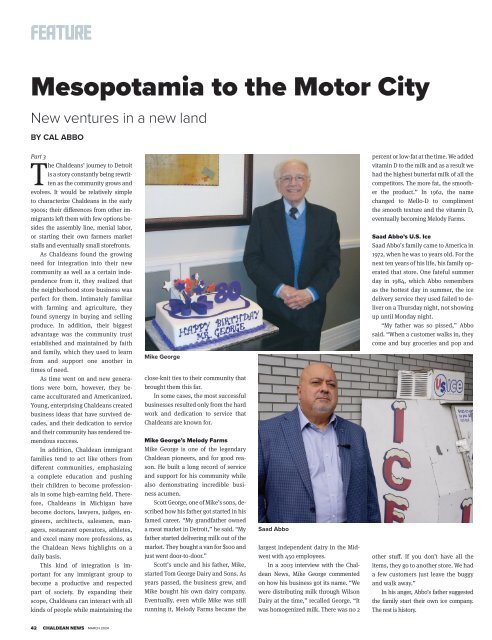Create successful ePaper yourself
Turn your PDF publications into a flip-book with our unique Google optimized e-Paper software.
FEATURE<br />
Mesopotamia to the Motor City<br />
New ventures in a new land<br />
BY CAL ABBO<br />
Part 3<br />
The Chaldeans’ journey to Detroit<br />
is a story constantly being rewritten<br />
as the community grows and<br />
evolves. It would be relatively simple<br />
to characterize Chaldeans in the early<br />
1900s; their differences from other immigrants<br />
left them with few options besides<br />
the assembly line, menial labor,<br />
or starting their own farmers market<br />
stalls and eventually small storefronts.<br />
As Chaldeans found the growing<br />
need for integration into their new<br />
community as well as a certain independence<br />
from it, they realized that<br />
the neighborhood store business was<br />
perfect for them. Intimately familiar<br />
with farming and agriculture, they<br />
found synergy in buying and selling<br />
produce. In addition, their biggest<br />
advantage was the community trust<br />
established and maintained by faith<br />
and family, which they used to learn<br />
from and support one another in<br />
times of need.<br />
As time went on and new generations<br />
were born, however, they became<br />
acculturated and Americanized.<br />
Young, enterprising Chaldeans created<br />
business ideas that have survived decades,<br />
and their dedication to service<br />
and their community has rendered tremendous<br />
success.<br />
In addition, Chaldean immigrant<br />
families tend to act like others from<br />
different communities, emphasizing<br />
a complete education and pushing<br />
their children to become professionals<br />
in some high-earning field. Therefore,<br />
Chaldeans in Michigan have<br />
become doctors, lawyers, judges, engineers,<br />
architects, salesmen, managers,<br />
restaurant operators, athletes,<br />
and excel many more professions, as<br />
the Chaldean News highlights on a<br />
daily basis.<br />
This kind of integration is important<br />
for any immigrant group to<br />
become a productive and respected<br />
part of society. By expanding their<br />
scope, Chaldeans can interact with all<br />
kinds of people while maintaining the<br />
Mike George<br />
close-knit ties to their community that<br />
brought them this far.<br />
In some cases, the most successful<br />
businesses resulted only from the hard<br />
work and dedication to service that<br />
Chaldeans are known for.<br />
Mike George’s Melody Farms<br />
Mike George is one of the legendary<br />
Chaldean pioneers, and for good reason.<br />
He built a long record of service<br />
and support for his community while<br />
also demonstrating incredible business<br />
acumen.<br />
Scott George, one of Mike’s sons, described<br />
how his father got started in his<br />
famed career. “My grandfather owned<br />
a meat market in Detroit,” he said. “My<br />
father started delivering milk out of the<br />
market. They bought a van for $100 and<br />
just went door-to-door.”<br />
Scott’s uncle and his father, Mike,<br />
started Tom George Dairy and Sons. As<br />
years passed, the business grew, and<br />
Mike bought his own dairy company.<br />
Eventually, even while Mike was still<br />
running it, Melody Farms became the<br />
Saad Abbo<br />
largest independent dairy in the Midwest<br />
with 450 employees.<br />
In a 2003 interview with the Chaldean<br />
News, Mike George commented<br />
on how his business got its name. “We<br />
were distributing milk through Wilson<br />
Dairy at the time,” recalled George. “It<br />
was homogenized milk. There was no 2<br />
percent or low-fat at the time. We added<br />
vitamin D to the milk and as a result we<br />
had the highest butterfat milk of all the<br />
competitors. The more fat, the smoother<br />
the product.” In 1962, the name<br />
changed to Mello-D to compliment<br />
the smooth texture and the vitamin D,<br />
eventually becoming Melody Farms.<br />
Saad Abbo’s U.S. Ice<br />
Saad Abbo’s family came to America in<br />
1972, when he was 10 years old. For the<br />
next ten years of his life, his family operated<br />
that store. One fateful summer<br />
day in 1984, which Abbo remembers<br />
as the hottest day in summer, the ice<br />
delivery service they used failed to deliver<br />
on a Thursday night, not showing<br />
up until Monday night.<br />
“My father was so pissed,” Abbo<br />
said. “When a customer walks in, they<br />
come and buy groceries and pop and<br />
other stuff. If you don’t have all the<br />
items, they go to another store. We had<br />
a few customers just leave the buggy<br />
and walk away.”<br />
In his anger, Abbo’s father suggested<br />
the family start their own ice company.<br />
The rest is history.<br />
42 CHALDEAN NEWS <strong>MARCH</strong> <strong>2024</strong>
















